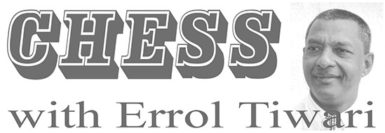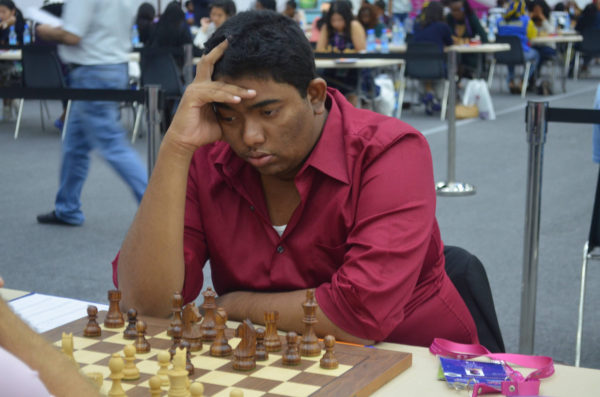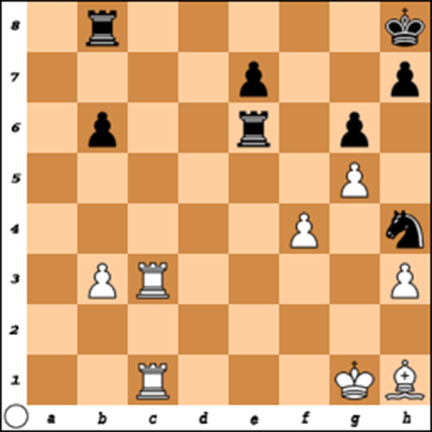 The 42nd Chess Olympiad in Baku, Azerbaijan, afforded Guyana the rare opportunity of showcasing its hidden chess talent and demonstrating a more glamorous side to the supposedly boring mind game. The Olympiad is like the Olympic games for chess players as chess is not played at the Olympics. A fierce and fiery debate is ongoing as to whether chess is a sport or not and whether it deserves to be an Olympic discipline. There is no physical activity involved in playing the game. While the agonizingly unsettling debate rages, chess activities continue.
The 42nd Chess Olympiad in Baku, Azerbaijan, afforded Guyana the rare opportunity of showcasing its hidden chess talent and demonstrating a more glamorous side to the supposedly boring mind game. The Olympiad is like the Olympic games for chess players as chess is not played at the Olympics. A fierce and fiery debate is ongoing as to whether chess is a sport or not and whether it deserves to be an Olympic discipline. There is no physical activity involved in playing the game. While the agonizingly unsettling debate rages, chess activities continue.

One such activity is the Olympiad, the biennial team competition that players consider the biggest international tournament on the chess calendar. Three medals—gold, silver and bronze—are offered for the team competition to an average of 170 nations. In addition, medals are distributed for the individual boards. It is reasonable to assume therefore, that only exceptional chess players can actually resolve to win medals for their country. For example, the USA won the gold medal this time around for the team competition in Baku after years of trying, and with the assistance of imported talent. The US team previously uplifted the gold medal in 1976 when the Olympiad was held in Israel. But the Soviet Union boycotted the Olympiad in Israel, so naturally, the US’s 1976 medal cannot be counted. The Soviet Union, defending champs, had boasted the strongest players in the world. Bobby Fischer had already disappeared from active chess.
Small nations like Guyana can aspire to win titles. Maria Varona-Thomas did win a respectable title. The nation should celebrate her victory. But since her return to Guyana, she has not appeared on any television programme to discuss her victory. The Guyana Chess Federation (GCF) represented the nation in chess at the Olympiad. The obligation therefore, is the GCF’s to promote Varona-Thomas’s victory to serve as a stimulant for schoolgirls throughout Guyana. Is the GCF attempting to hide this magnificent victory for fear of being confronted with the penetrating questions about chess that may be asked by television interviewers?
If the 42nd Chess Olympiad essentially resonates as the chess equivalent of the Olympics, and boasted the strongest and toughest field in the Olympiad’s 89-year-old history, the GCF should move to have its team featured, either as a group or individually, on television. It would be a fulfilling way to endorse the GCF within the minds of a wide cross section of people and further popularize the game.
In the men’s team that represented Guyana at the Olympiad, Taffin Khan was the pick of our players. He played 10 games and scored six points. He was followed by Haifeng Su who played 11 games and finished with 4½ points. The other three participants were considerable disappointments. Anthony Drayton, our top board player, played nine games and ended on 2½ points. However, playing Board One at any Olympiad for one’s country, represents a herculean task. On Board One, you have to face the top guns in chess from around the world. But someone has got to do it. Regrettably, Drayton lost some 60 valuable FIDE rating points depleting him from a rank of 1923 to 1860. Drayton should take into consideration the two instances when Khan was promoted to the top board against Bermuda and Macau and won both games.
Drayton has to work assiduously to regain his lost rating points. The other two men’s team members were Ronuel Greenidge and Roberto Neto. Greenidge ended with one point from eight games, while Neto managed two draws from six games, playing the lower boards. If the GCF had held a democratic qualifying chess competition to determine the participants of the Olympiad team, Drayton, Khan and Su would have been certain qualifiers. Greenidge, no. And his empty performance at the Olympiad demonstrates this fact. The last serious tournament in which Greenidge participated was the Umada Cup in 2014.
On the other hand, Neto would have been forced to fight for his place at the Olympiad.
Chess games
Here are four games which were played by the Guyana men’s team at the 42nd Olympiad in Azerbaijan.
White: Anthony Drayton 1923 (Guyana)
Black: Trajce Nedev 2484 (Macedonia)
- d4 Nf6 2. c4 g6 3. g3 Bg7 4. Bg2 O-O 5. Nc3 d6 6. e4 c5 7. dxc5 dxc5 8. Qxd8 Rxd8 9. e5 Ng4 10. Nd5 Nc6 11. f4 f6 12. h3 Nh6 13. exf6 exf6 14. Be3 Nf5 15. Bf2 Re8+ 16. Kf1 Rb8 17. Ne2 Nfd4 18. Nxd4 Nxd4 19. Bxd4 cxd4 20. Rd1 f5 21. b3 Bd7 22. Nb4 a5 23. Nd3 b5 24. Nc5 Bc8 25. Bc6 Re3 26. cxb5 Rxg3 27. Kf2 Rc3 28. Rc1 Bf8 29. Rxc3 dxc3 30. Na4 Bd6 31. Nxc3 Bxf4 32. Rd1 Be6 33. Bd5 Kf7 34. a4 Be5 35. Rd3 g5 36. Ne2 Rc8 37. Bc6 h5 38. Ke3 Kf6 39. Nc3 f4+ 40. Kf2 g4 41. hxg4 hxg4 42. Nd5+ Kg5 43. Nb6 Rh8 44. Nc4 Bc7 45. Nd2 Bb6+ 46. Kg2 f3+ 47. Bxf3 gxf3+ 48. Nxf3+ Kf4 49. Kf1 Bf5 50. Rc3 Rh3 51. Ke2 Be4 52. Rc8 Bxf3+ 53. Kd2 Be4 54. Rf8+ Bf5 55. Rb8 Rh2+ 0-1.
White: Filip Pancevski 2503 (Macedonia)
Black: Taffin Khan 1877 (Guyana)
- e4 c6 2. d4 d5 3. e5 c5 4. dxc5 Nc6 5. Nf3 e6 6. Be3 Qc7 7. c3 Bd7 8. Bd4 Nge7 9. Bd3 a5 10. Na3 Nxd4 11. cxd4 Ng6 12. Nb5 Bxb5 13. Bxb5+ Kd8 14. O-O Ne7 15. a3 Nc6 16. b4 Be7 17. Qd2 h6 18. Rab1 Ke8 19. Bxc6+ Qxc6 20. bxa5 Qa4 21. Rxb7 Qxa3 22. Rfb1 Bd8 23. Qf4 Rf8 24. h4 Qxa5 25. Qg4 Rg8 26. Ne1 Qd2 27. Qf3 Rf8 28. Qb3 Qa5 29. Nc2 Qa4 30. Qb2 Qc6 31. Rb8 Kd7 32. Rxa8 Qxa8 33. Ra1 Qc6 34. Qb8 Qc8 35. Ra7+ 1-0.
White: Ronuel Greenidge 1723 (Guyana)
Black: Aleksandar Colovic 2432 (Macedonia)
- d4 Nf6 2. c4 e6 3. Nc3 Bb4 4. e3 b6 5. Ne2 Ba6 6. a3 Bxc3+ 7. Nxc3 d5 8. b3 O-O 9. Be2 Nc6 10. cxd5 Bxe2 11. Qxe2 exd5 12. O-O Re8 13. Qc2 Qd7 14. Bd2 Ne7 15. Rac1 Rac8 16. Na4 c6 17. Rfd1 Nf5 18. b4 Nd6 19. Nb2 Nfe4 20. Qb3 b5 21. Be1 Nc4 22. Nd3 Qf5 23. Ra1 Re6 24. a4 Rf6 25. axb5 Nxe3 26. Ne5 Nxd1 27. Qxd1 cxb5 28. Rxa7 Nxf2 29. Qe2 Qe4 30. Qd1 Nxd1 0-1.
White: Toni Lazov 2288 (Macedonia)
Black: Haifeng Su 1800 (Guyana)
- e4 c6 2. d4 d5 3. e5 Bf5 4. Nd2 e6 5. Nb3 Nd7 6. Nf3 Ne7 7. Be2 Nc8 8. O-O Be7 9. Ne1 O-O 10. Nd3 Ncb6 11. g4 Bxd3 12. cxd3 f6 13. f4 g5 14. f5 fxe5 15. fxe6 Rxf1+ 16. Qxf1 Nf8 17. Qf7+ Kh8 18. dxe5 Ng6 19. d4 Qc7 20. Bxg5 Rf8 21. Bf6+ 1-0.
Chess puzzle
Solution to last week’s puzzle
 Surya Ganguly vs Jordy Mont-Reynaud, Bratislava, 1993.
Surya Ganguly vs Jordy Mont-Reynaud, Bratislava, 1993.
White to play and win.
White played: Qb7+ Ka5 Rd5+.








